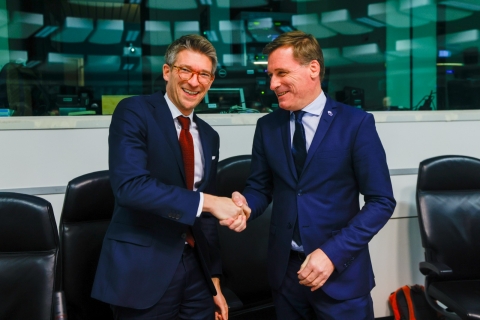European Economic
and Social Committee
EESC President
EESC President
Organised civil society must be at the heart of Europe's efforts to build a prosperous and more sustainable economy
Making the European economy more resilient and dynamic through growth while at the same time prioritising environmental protection are not mutually incompatible but essential to future-proofing the continent's society. That is the main message from a European Economic and Social Committee conference "Sustainability and prosperity at the heart of the European project", held on 30 November on the fringes of an extraordinary Bureau meeting, where the EESC met with the upcoming Belgian presidency of the Council of the EU.
Belgium's deputy prime minister with responsibility for the economy and employment Pierre-Yves Dermagne and EESC president Oliver Röpke opened the conference, which analysed the issues and challenges facing Europe as it seeks to restructure the economy for the long term in the context of the Green Deal's 2050 net-zero commitment.
Next year's elections will be a real test for the EU and our democracies. We see a growing distrust of Europeans towards the EU, which has boosted far-right parties
, explained Oliver Röpke. To gain back this trust, the EU needs to address everyday matters that actually concern our citizens. The Belgian Presidency of the EU comes at a crucial time for Europe and I look forward to working together.
In its work, the EESC consistently highlights the growth opportunities for the EU economy of adopting a greener, more sustainable approach to production and consumption, delivering profits for businesses and strengthening workers' rights and well-being.
Deputy minister Pierre-Yves Dermagne, in charge of both economy and employment, insisted on the importance for the future presidency of the Council to work with actors such as the EESC, to ensure the social dimension of the future of Europe, which is a key element of its competitiveness as well.
The first session of the conference looked at the challenges Europe faces on sustainability. Keynote speaker Sandrine Dixson-Declève (co-president of the Club of Rome) was followed by a debate between Agata Meysner (director of Generation Climate Europe) and Catherine Lenaerts (managing director of Febelauto and deputy CEO of Watt4Ever).
The second session built on the first by assessing the prospects for maintaining and boosting prosperity in Europe. Keynote speaker Francesco Corti, adviser to both the Belgian deputy PM and the minister for social affairs and health was followed by a discussion between Bea Cantillon (professor at Herman Deleeck Centre for Social Policy, University of Antwerp) and Michel Croisé (former CEO of Sodexo Belgium/Luxembourg).
Belgian state-minister Louis Michel closed the conference by giving his views on the challenges faced by the EU ahead of the 2024 elections. Europe is not the problem, it is the solution
, he concluded.
Work organisation
Downloads
Contact
Oliver Röpke European Economic and Social Committee rue Belliard/Belliardstraat99-101 1040 Brussels Belgium
Tel (secretariat): +32 (0)2 546 99 32
Email (secretariat)
Media Contact
For press and media inquiries, please contact the President's SpokespersonFor photos of the President, please consult the EESC Media Library
